10. Strategic Thinking
Or as Bush 43 called it, “strategery.” From reading Lao Tzu’s Art of War in history and philosophy courses, to an English major’s laborious task of outlining and planning the myriad of essays, papers, etc. required of him or her to write (because multiple-choice tests aren’t liberal enough, right?) — a liberal arts education develops the mind for strategic thinking. Furthermore, as the Harvard Business Review states, energetic strategic thinking for today’s dynamic markets requires creativity (see #3), i.e. businesses differentiating themselves from their competitors. Creativity is at the heart of a liberal arts education.
9. Open-Mindedness
Voltaire once said that as fallible human beings, we ought to all reciprocally pardon each other’s inherent frailty and error — the first law of nature. This French dramatist and philosopher, a man of letters, is the most quintessential, open-minded bloke in history. If you disagree with me, I’m open to discussion and rebuttal in order to be proved wrong 😉 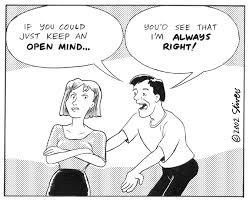
8. Emotional Intelligence
Emotional Intelligence is the ability to identify, assess, and control one’s own emotions. As Aristotle once said, the temperate man is one who knows how to get angry at the right time, to the right degree, in the right situation, and at the right thing. That’s Emotional Intelligence. Soooo throwing your control at the television because Tony Romo blew another Cowboys’ game, might not be emotional intelligence. The term gained acclaim in Daniel Goleman’s seminal book, Emotional Intelligence. Now, How does the Liberal Arts help develop this? A study in the Journal of Science concluded that those who read a lot of literary fiction (NOT popular fiction; so none of that 50 Shades of Gray crap) tend to be more adept in empathy, social perception, and emotional intelligence. Thus, give your college English profs a hug and bust out your Jane Austen! 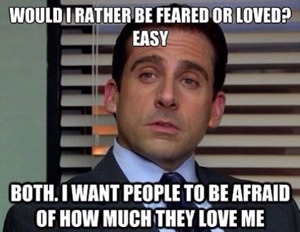
7. Public Speaking
Public Speaking ranks at #1 as the greatest fear that people face. This apparently trumps the fear of death and clowns. Yikes! Most Liberal Arts curriculums require its liberally-minded students to take a public speaking course. But most importantly, public speaking (rhetoric) was originally one of the first Liberal Arts. There is a reason why major companies and corporations invest a lot of money in motivational speakers. If all else fails, and you don’t get hired by Apple or Google (see #3) because of your fantastic public speaking skills, you can always start your own mega-church.
6. Ethics
As the pithy Abraham Lincoln once said, “When I do good, I feel good. When I do bad, I feel bad. That’s my religion.” Surely, Lincoln’s virtue stems partially from all the literary fiction reading he did as a boy? (see #8). From Military Ethics to Business Ethics to Biomedical Ethics, universities offer a plenitude of practical ethics classes for its students. Knowing “right” from “wrong” can save businesses from catastrophe. Knowing “right” from “wrong,” as a medical doctor, can save lives. Unless you’re Dr. House. Dr. House is always right.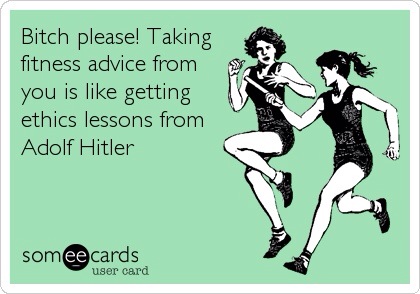
5. Leadership
A Liberal Arts education is a significant contributor to the career success of leaders in the business, government and nonprofit sectors. Hmmm… Is there a correlation between charismatic leaders and public speaking? (See #7). Yes.
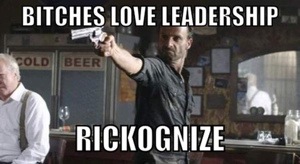
4. Writing and Grammar
Is it “their” or “there?” Should I use the Oxford comma? And what the hec is a dangling participle? Sure, you might have learned this stuff in grade school, but likely brain dumped it once you got older. Fortunately, when you seek a Liberal Arts education writing grammatically-correct papers is the norm; otherwise, you will fail your finals. Now, why is it important to be able to write well? (NOT write “good,” dammit!) Well, apart from becoming a self-proclaimed grammar nazi, writing is directly linked to effective communication and leadership. (See #5 and #2). There is a reason to why “the pen is mightier than the sword.” Because jamming a pen in another’s eye probably hurts more than sticking a sword in someone’s gut?
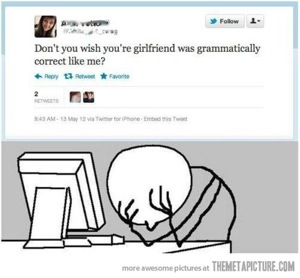
3. Innovation
Redundancy is retention: Creativity is at the heart of a liberal arts education. (See #10). The great Steve Jobs fervently believed that the Liberal Arts are essential for innovation. Naturally, innovation litters Silicon Valley. But are all those who work in Silicon Valley engineers? Nay. Surprisingly, there is a preponderance of folks who work for Google, Apple, and Facebook that have degrees in the Liberal Arts and Humanities. Would Steve Jobs hire Plato? Highly likely.

2. The Three Cs: communication, collaboration, critical thinking
We’re all familiar with the basic “3 R’s” of Reading, Writing, and Arithmetic. Unfortunately, in today’s day and age, where China is outpacing us in economic drive, and the United States ranks 17th globally in education, the 3 R’s are no longer enough. In That Use to Be Us, the authors provide suggestions in supplementing the basic 3 R’s, specifically by adopting Tony Wagner’s – the Innovation Education Fellow at the Technology and Entrepreneurship Center at Harvard – definition of better education: An emphasis on the three C’s, which are critical thinking, effective oral and written communication, and collaboration. What kind of education exclusively focuses on the the aforementioned three? The Liberal Arts. Failing to communicate effectively can lead to death by a killer bunny.
1. Happiness
Alright, this is cliche. But it is not any less true. Reading classical literature is good for the brain. Research done at Emory University has found that being pulled into a riveting novel can actually trigger measurable and tangible changes to the physical brain in positive and felicitous ways? (again, none of that 50 Shades of Gray crap!) After a long, terrible day at work, do you ever find yourself wanting to crawl into your bed and open up a good book to read, so to make yourself feel better? That’s the spirit of the Liberal Arts. It’s an ethereal engagement. But I think, most importantly, the Liberal Arts prepares you for the rigidity of life. As the wonderful prosaic poem, Desiderata, puts it:
“And whatever your labors and aspirations
in the noisy confusion of life, keep peace in your soul.
With all its sham, drudgery, and broken dreams,
it is still a beautiful world. Be cheerful. Strive to be happy.”
When you are twenty-something, unaware of the existential angst that might lie ahead as you get older, or the great hardships in store for you as you enter the world on your own, it’s important to be prepared. A business degree will prepare you for life by getting you a job. But a Liberal Arts education is the only kind of education that will prepare you for the tribulations of life that you will face, sooner or later. A Liberal Arts education is the only kind of education that gives you the tools to strive to be happy. 
—————————————
SOME OTHER THOUGHTS…
I have a Bachelor of Arts in Philosophy. I love reading and thinking. I’ve loved doing both since high school, so I knew from the outset I wanted to study philosophy in college. Do I regret my degree today, now that I’m in the big-boy world where jobs are scarce and competition is fierce? Absolutely not. Fortunately, I had enough philosophic sense as a freshman in college to be self-aware of the fact that a philosophy degree will make it very difficult to get a job, so I worked out a lot, practiced saying my “yes Sir’s/Mam’s,” shaved my head, and thus ensured my future will be OKAY by joining the military — at least for a little while.
But why is that? Why are liberal arts degrees chastised nowadays for supposedly stiffening success in finding a job? And these are not philosophic questions. What is it with these articles, like this one by Yahoo Finance about useless degrees, most of which are liberal arts degrees? Or this one article by US News about 11 Hot Majors, none of which are liberal arts degrees, and wherein a Video Gaming Degree trumps reading Shakespeare (seriously, has our society’s self-degradation brought us to the point where Grand Theft Auto means more to us than Hamlet? *now THAT’S a philosophy question!*)
Oh, but it gets better! Such articles, like Yahoo and US News, tell us that liberal arts degrees suck and that the more successful degrees are technical, money-garnering, and involve attractive people. Yes, especially Yahoo — apparently all the hot chicks in the world get the “right” degrees:
“Don’t Bother Earning These Degrees” — Yahoo Education. So instead earn a Business Degree like this hot woman did

“Yahoo’s Ten College Degrees that yield high-paying jobs” — yes, because we all know how smart blondes are.

And for the ladies and gay men out there, apparently only handsome men earn trendy degrees: “Yahoo’s Top 6 college degrees trending”

Now, to be fair, I did come across a listing that I think did some justice to liberal arts degrees. The Princeton Review had a
“Top 10 College Degrees,” which is very fair.
Irrespective of the morons who write these parochial “top # something” lists, I had to think to myself: Why does our capitalistic society hold the liberal arts to such low esteem? Surely, Adam Smith found abundant value in philosophy that helped him develop the ideas of capitalism. Where once, in antiquity, during the age in which Sparta stood resolved at Thermopylae, up to the time that Caesar infamously crossed the Rubicon, a liberal education in philosophy, art, politics, and rhetoric was required of the most prosperous and rich. Hell, a freakin’ Roman Emperor was a philosopher! But today, a liberal arts education is subject to admonishment in comparison to a degree in accounting or computer science. What happened?
Well, maybe the morons who make the lists have a point. A liberal arts education does not usually make people materially rich nowadays. The success that a liberal arts education can provide to an individual is not measured by statistics, amount of median salary, and the sort; the success a liberal arts education brings is immeasurably intangible, but worth so much more than what a degree in environmental science and chemical engineering can bring you.
But most importantly in a practical and pragmatic sense: An individual educated in the liberal arts can make businesses successful and a crap load of money. Or to use more elegant, liberal arts kind of language — The ubiquitous appreciation of the liberal arts will lead to burgeoning businesses, encouraging profits to soar as high as the human soul when in the presence of the gods.
In short, the 21st century should re-think its ill-regard for the liberal art and shush its dubiety of a liberal arts education making businesses money. Studying English, Theater Arts, and Philosophy is not just for fun. What you learn in the liberal arts is beyond technicality; you learn a way of life that leads to success. So I’ve compiled a top 10 list (yes, that makes me a moron too) of attributes a liberal arts degree nourishes in people that will make them successful in the business world and the regular world (or as philosopher Martin Heidegger calls it, the das Umwelt) These attributes are intangibles, but nevertheless their efficacy are noticeable in all successful individuals schooled in the liberal arts. Cheers.
——————————————————-


